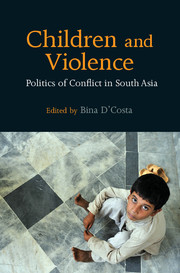Book contents
- Frontmatter
- Dedication
- Contents
- List of Map, Figures and Tables
- Acknowledgements
- Introduction: ‘Turtles Can Fly’: Vicarious Terror and the Child in South Asia
- Part I Shaping Childhood in South Asia
- 1 Children and Civil Society in South Asia: Subjects, Participants and Political Agents
- 2 ‘We Will Work Harder to be Our Own Boss’: Children, Vulnerability and Structural Violence
- 3 The Kite Runner: Children, Violence and the Ethnic Imaginary in Afghanistan
- Part II Conflict and Violent Peace
- Part III Rights, Needs and Protection
- Part IV Reflections from Human Rights Advocates in the Region
- Bibliography
- Notes on Contributors
- Index
3 - The Kite Runner: Children, Violence and the Ethnic Imaginary in Afghanistan
from Part I - Shaping Childhood in South Asia
Published online by Cambridge University Press: 05 June 2016
- Frontmatter
- Dedication
- Contents
- List of Map, Figures and Tables
- Acknowledgements
- Introduction: ‘Turtles Can Fly’: Vicarious Terror and the Child in South Asia
- Part I Shaping Childhood in South Asia
- 1 Children and Civil Society in South Asia: Subjects, Participants and Political Agents
- 2 ‘We Will Work Harder to be Our Own Boss’: Children, Vulnerability and Structural Violence
- 3 The Kite Runner: Children, Violence and the Ethnic Imaginary in Afghanistan
- Part II Conflict and Violent Peace
- Part III Rights, Needs and Protection
- Part IV Reflections from Human Rights Advocates in the Region
- Bibliography
- Notes on Contributors
- Index
Summary
On September 16, 2007, Marc Forster's film The Kite Runner, based on Khaled Hosseini's 2003 novel by the same name, goes for its official debut in the White House. It is screened for President George W. Bush, his defense team, and few other invited guests. Ostensibly the film serves the strategic and propaganda interests of this small audience, given the War on Terror raging in Afghanistan. Interestingly, Hosseini is also one of the invited guests. His participation in the screening event, and a photo-op with the President and the First Lady, seems to given an impression that he also gives way to the strategic appropriation of his novel. Hence his participation in the perverse screening event causes some disadvantage of novel's creative and critical dimensions. In this essay, we aim to wrench back the novel and film from the strategic and instrumental appropriation, and restore them as works of creative and critical art. Accordingly, in this chapter, we make a preliminary effort by focusing on one of the critical dimensions, that is the ethnic and sectarian imaginary in Afghanistan, and demonstrate how the novel and film register an intervention in the violence entailed by the imaginary. In so doing, the chapter breaks somewhat from the approach in the bulk of chapters that tend to plug local cases into macro level narratives about enforcement of, or compliance with international standards on children's rights. It however utilizes more of a literary and film studies approach to reading Afghan audience's reception of The Kite Runnerin Afghanistan.
While in the US the film gets its highest attention at the White House, in Afghanistan the government places ban on it. Given several street protests in Kabul, the government claims that the film presents the ethnic groups in ‘a bad light,’ and therefore could trigger an ethnic and sectarian controversy. Din Mohammad Rashed Mubarez, the-then deputy minister of the Ministry of Information and Culture, explained the ban in the following words: ‘We respect freedom of speech, we support freedom of speech, but unfortunately we have difficulties in Afghan society, and if this film is shown in the cinemas, it is humiliating for one of our ethnic groups.’ Interestingly, later the Taliban also protested claiming that they were placed in the bad light too.
- Type
- Chapter
- Information
- Children and ViolencePolitics of Conflict in South Asia, pp. 84 - 102Publisher: Cambridge University PressPrint publication year: 2016



